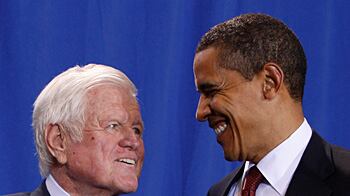
In a conversation with Richard Wolffe, author of Renegade: The Making of a President, a senior Obama aide busts the myth that Ted Kennedy's passing will help the cause of health-care reform. Plus, what Obama envied about Kennedy.
He called it the cause of his life, although he did not live to see it turn into reality. But has the passing of Ted Kennedy breathed new life into the cause of health care?
Inside the White House, Obama’s senior aides say it’s too early to tell. Such caution may be natural after a summer in which the so-called health-care debate has spun off in wildly unpredictable and unreasonable directions.
“One thing I can say for sure,” said a senior White House aide. “We’d much sooner have him leading the effort, than inspiring it through his memory.”
“One thing I can say for sure,” said one senior White House official of Kennedy’s impact on health care. “We’d much sooner have him leading the effort, than inspiring it through his memory.”
The White House has sorely missed Kennedy’s unique talents and status through the long hot summer of the health-care debate: both because of his expertise in policy and his personal abilities to find common ground with key Republicans.
Now what remains is the inspiration of Kennedy’s memory—an emotional legacy that speaks far more to Democrats than Republicans.
Kennedy was not just the liberal lion. He was the master negotiator, who could forge compromises with conservatives while never losing the trust of progressives. He handed George W. Bush one of his biggest domestic achievements in No Child Left Behind, yet he would later tear President Bush apart on the war in Iraq.
Click Image Below to View Our Gallery

The only figure to come close to Kennedy’s potential to carve out a health-care compromise is no longer serving in the Senate. Tom Daschle, the former Democratic leader, wrote a blueprint for health-care reform earlier this year, alongside Republicans Bob Dole and Howard Baker. Their work for the Bipartisan Policy Center appears to be the most promising ground for any cross-party talks in the fall.
In many ways, Kennedy represented the model of the kind of compromising yet progressive politics that Barack Obama has tried to make his own. The difference, at least in the Senate, was that Kennedy had the seniority and the skills to turn those compromises into legislation. In his brief time in the Senate, Obama looked up to Kennedy but suffered from an inflated sense of what he could achieve as the 99th senator of 100 in seniority.
He sought out Kennedy’s advice as to how to work in the Senate, just as he reached out to Hillary Clinton. But he had little notion in the early stages of his time in Washington about how his junior ranking would limit his influence. “I anticipated on the big-ticket items that I cared about, like universal health care, that I would be second chair, or third or fourth chair to people like Ted Kennedy, who’d been working on it for a very long time,” Obama told me in an interview last year for my book Renegade. “But I thought that I could contribute good ideas and help shape the agenda.”
In fact Obama was much further behind Kennedy than one or two chairs on an issue like health care.
Even after winning the Iowa caucuses and vaulting into one of the two top slots in the presidential primaries, Obama needed Kennedy more than Kennedy needed Obama.
Kennedy’s endorsement, just after Obama’s resounding victory over Clinton in the South Carolina primary, represented something more than just a statement to the party establishment. Kennedy, alongside his son Patrick and niece Caroline, made an explicit connection between his presidential brother and the young senator from Illinois.
“There was another time, when another young candidate was running for president and challenging America to cross a new frontier. He faced public criticism from the preceding Democratic president, who was widely respected in the party,” Kennedy told a raucous crowd of students at the American University in Washington. “Harry Truman said we needed ‘someone with greater experience’ and added: ‘May I urge you to be patient.’ And John Kennedy replied: ‘The world is changing. The old ways will not do. It’s time for a new generation of leadership.’ So it is with Barack Obama. He has lit a spark of hope amid the fierce urgency of now.”
• The Daily Beast's Complete Kennedy Coverage: Tributes, Photos, and VideosFor Obama, Kennedy’s backing was almost overwhelming. “It was the first time I got emotional,” he told me. “I actually choked up. It wasn’t just the endorsement. It was the young people out there. You could see that it was something similar to what had happened all those years ago.”
That emotional connection grew into a trusted friendship with Caroline Kennedy, who was one of just two senior advisers—alongside Eric Holder, now attorney general—to recommend potential vice-presidential picks. Kennedy and Holder both settled on her uncle’s close Senate friend, Joe Biden.
The Kennedy-Obama connection continued with the emotional appearances of a stricken Ted Kennedy at the Democratic convention in Denver, and at Obama’s historic inauguration in January.
To a president who rarely grows emotional in public—and shares few emotional connections with any politician—Ted Kennedy held a unique position. The burning question is not just whether Kennedy’s passing inspires other senators to pass a health-care overhaul. The question is whether it inspires the White House to fight for a legislative compromise that Kennedy could have lived with.
Richard Wolffe is Daily Beast columnist and an award-winning journalist, political analyst for MSNBC, and senior strategist at Public Strategies. He covered the entire length of Barack Obama's presidential campaign for Newsweek magazine. His book, Renegade: The Making of a President, was published by Crown in June.






